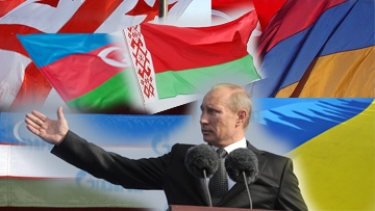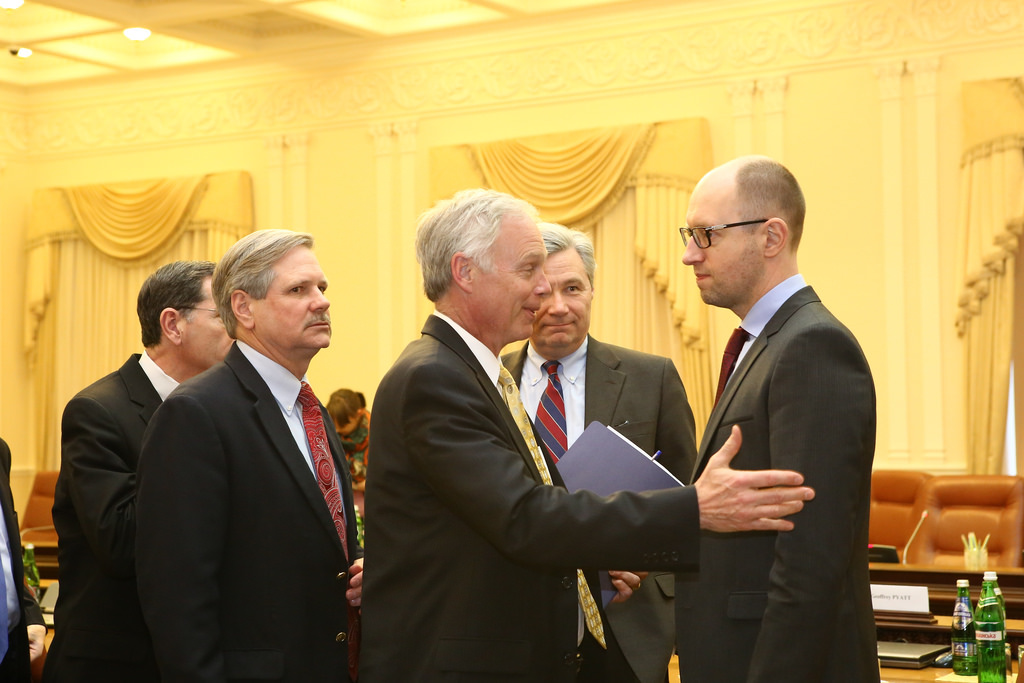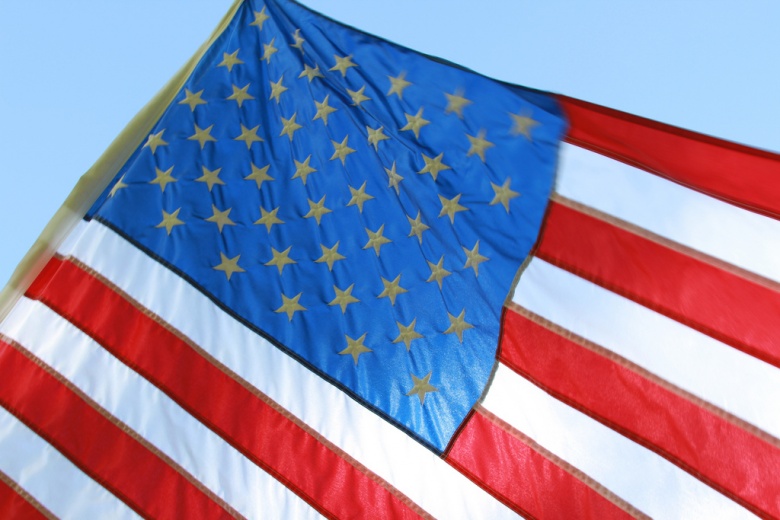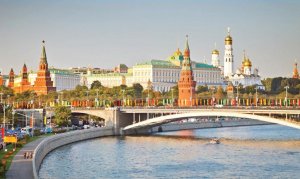
 In 2010 a Customs Union comprising Russia, Belarus and Kazakhstan was launched as part of a Russia-led project aimed at economic reintegration within the former Soviet space (as Russian President Vladimir Putin explained in an article published in Izvestiya in October 2011). Evidence gathered during the short period of the Union’s existence suggests this project has been a success to date. For example, the London-based European Bank for Reconstruction and Development – a multilateral institution whose main function is to lend to the former Communist states – has concluded that its launch has led to a strong increase in mutual trade, thus helping boost economic growth in the member countries.
In 2010 a Customs Union comprising Russia, Belarus and Kazakhstan was launched as part of a Russia-led project aimed at economic reintegration within the former Soviet space (as Russian President Vladimir Putin explained in an article published in Izvestiya in October 2011). Evidence gathered during the short period of the Union’s existence suggests this project has been a success to date. For example, the London-based European Bank for Reconstruction and Development – a multilateral institution whose main function is to lend to the former Communist states – has concluded that its launch has led to a strong increase in mutual trade, thus helping boost economic growth in the member countries.The drive toward deeper economic integration within the former USSR accelerated in 2012 with the formation of a Single Economic Space (SES), along with a Moscow-based Eurasian Economic Commission. Apart from the gradual reduction of trade barriers, the goal is the full liberalization of intra-SES flows of goods, capital and labor and ultimately the creation of a unified market of nearly 180 million consumers, underpinned by the tried-and-tested principles of liberal economics. Among other measures, businesses from member countries are to enjoy equal rights within the SES, including in the bidding for government contracts. Russia’s ultimate objective is to establish a Eurasian Union (EAU) by 2015. It hopes that more countries from the former Soviet bloc will become interested in joining the group, including the second-most populous former Soviet country – Ukraine.
Unsurprisingly, Moscow’s proposals have met with alarm in some quarters in the West, especially in Washington. Last year outgoing US Secretary of State, Hillary Clinton, warned against Russia’s attempts to resurrect the Soviet Union. And senior Republican Senator John McCain is on record as saying that the EAU is "an old idea that the Russians have had dating back to the days of the tsars”.
Rejecting the charge that the Kremlin wants to revive the USSR, Putin has pointed out that his call for deeper integration "is based on new values and a new economic foundation”. He draws an analogy with the European Union, suggesting that the EAU would benefit from the positive experience of the EU, not least by adopting the latter’s regulatory and technical standards. Thus, far from restoring the isolationist USSR, the EAU will serve as a bridge between the EU and the fast growing Asia-Pacific region. Moreover, according to Putin’s vision, it has the potential to become an integral building block of a "harmonized community of economies stretching from Lisbon to Vladivostok”.
This positive vision contrasts sharply with a recent assessment by the Washington-based Heritage Foundation of Russia’s plans for the EAU. The Foundation’s strongly criticizes what it sees as Moscow’s attempt to restore control over the resource-rich Central Asian countries. It argues that Russia’s chief objective is to prevent the former Soviet republics from developing deeper ties with other major players, notably China, the EU and the United States. Thus the EAU should be regarded, above all, as a retrograde, neo-imperialist project driven by Russia’s need to increase its weight in the face of unrelenting decline.
And because the Foundation sees Russia as an autocratic state, it argues that Moscow’s shenanigans in the former Soviet Union threaten to undermine regional stability, economic and political freedoms and limit countries’ sovereignty. For all these reasons, the West – and especially the United States – must actively oppose Russia’s plans, the Foundation concludes.
Questions:
To what extent should the West be alarmed by the emergence of a Eurasian Union?
Should it oppose Moscow’s plans? And if so how?
Is Putin’s vision of post-Soviet economic integration realistic?
 The topic for the Discussion Panel is provided by Vlad Sobell,
The topic for the Discussion Panel is provided by Vlad Sobell,Editor, Expert Discussion Panel
Professor, New York University, Prague
Editor, Consensus East-West Europe
Expert Panel Contributions
Edward Lozansky
President of the American University in Moscow, Professor of World Politics at Moscow Sate University
Martin Sieff
Senior fellow at the American University in Moscow, Chief Global Analyst at The Globalist
Who is afraid of the Eurasian Union?
Speaking recently to the press, New York Senator Chuck Schumer blasted Russia for allowing Edward Snowden to land in Moscow. "The bottom line is very simple: allies are supposed to treat each other in decent ways and Putin always seems almost eager to put a finger in the eye of the United States,” bitterly observed Schumer.
Allies? Treating each other decently? This is a breaking news but since when US and Russia became allies? We certainly wish they were and there was indeed a very short window of opportunity for this to happen after the collapse of communism and the disintegration of the Soviet Union about 22 years ago. However, the United States and Europe did not seize this historic chance and instead of doing a serious effort for making Russia a real and powerful ally by integrating it into major western political, economic, and security structures did just the opposite by unceremoniously rebuffing all Russia’s attempts to achieve this goal.
The most tragic mistake, in the words of the late and one of the most outstanding US diplomats George Kennan, was the NATO expansion which actually started during Yeltsin’s reign, the times which ironically many in the West now describe as the brief period of real democracy in Russia.
''I think it is the beginning of a new cold war, the Russians will gradually react quite adversely and it will affect their policies. I think it is a tragic mistake. There was no reason for this whatsoever. No one was threatening anybody else. This expansion would make the Founding Fathers of this country turn over in their graves. We have signed up to protect a whole series of countries, even though we have neither the resources nor the intention to do so in any serious way,” said Kennan to New York Times in 1998.
Many other mistakes followed like unilateral ABM treaty cancellation, direct support of color revolutions on post-Soviet space, calling Russia the aggressor in the 2008 war when it was Georgia who started it, adopting absolutely senseless and harmful Magnitsky Act, and many others.
U.S. President Barack Obama through his policy of "resetting” relations with Russia was trying to correct some of the past mistakes but Hillary Clinton in her last days as the Secretary of State effectively disavowed all the achievements of Obama’s first term by bluntly describing Russian President Vladimir Putin’s idea of Eurasian Union as a move to resurrect the Soviet Union and adding that the United States will "figure out effective ways to slow down or prevent it.”
Doesn’t sound like she was talking to an ally, does it? Therefore, all of us who have actually been trying to promote U.S. – Russia alliance had a great sigh of relief with the news of John Kerry replacing an erratic Hillary as Secretary of State. Unfortunately, the exaltation did not last long as Syria and Snowden led to Kerry’s loss of temper. However, he and the White House quickly cooled down and we should expect some progress in Kerry’s upcoming talks with Russian Foreign Minister Sergei Lavrov and the Putin-Obama summit in St. Petersburg in September.
Regrettably, there are still plenty of folks in DC who, like Clinton, have sleepless nights because of Eurasian Union and who are not very happy with Obama’s administration being too soft on this subject. In their opinion he must send thunder and lightning in Moscow’s direction for pursuing this extremely "dangerous” to America project.
At a recent seminar at the Heritage Foundation on June 27 titled "Russia’s Eurasian Union Could Endanger the Neighborhood and U.S. Interests” it was obvious that the emerging Union between Russia, Kazakhstan and Belarus is not viewed positively by policymakers or pundits.
Fred Starr, chairman of the Central Asia and Caucasus Institute (CACI) at the School for Advance International Studies of Johns Hopkins University, summed up the consensus by describing the Eurasian Union as a "hangover of empire” from the Soviet era. According to Starr membership in WTO should be enough for the countries of this region and he sees no additional benefits for them from the membership in this Union.
Another speaker Stephen Blank from the U.S. Army War College compared the Eurasian Union to the Zollverein, the German Customs Union from 1834 to 1871. He noted that the Zollverein had been dominated by Prussia, the largest purely German state, and that it had been a primary vehicle by which Prussia became the dominant power in Germany and eventually unified it on Berlin’s terms.
Blank’s Zollverein parallel for the Eurasian Union was a significant one, but not for the reasons he argued. For the Zollverein was an enormous economic success, not just for Prussia but for all the peoples of Germany.
In 1834, the population of a still largely rural Germany was just over 30 million. By 1871, it had risen by 25 percent to almost 41 million. More important, Germany carried out its Industrial Revolution and its annual Gross Domestic Product more than doubled. It became the largest and most prosperous industrial economy in Europe, outstripping those of Britain, France and Russia. This prosperity was shared by all Zollverein member states.
The Zollverein certainly did not isolate Germany from the booming global economy. Instead, it allowed all parts of Germany to participate in it economy on far more advantageous terms. The Eurasian Union holds out the same prospects not just for Russia but also of Belarus and Kazakhstan and other states that might join it in the future.
Sergei Markedonov from the Institute for Political and Military Analysis in Moscow, and a Visiting Fellow at the Center for Strategic and International Studies (CSIS) was the lonely voice who tried to emphasize the economics as the main driving force for the Union but all others were talking about dangerous Russia’s geopolitical and security ambitions that dominated this initiative.
So when European Union (EU), North American Free Trade Association (NAFTA,) Mercosur free trade bloc between Brazil, Argentina, Venezuela, Paraguay and Uruguay, the 10-nation Association of Southeast Asian Nations (ASEAN) are forming similar Unions it is OK but when Russia is promoting something like that it obviously has a hidden agenda with the evil intentions.
This is not to say that there shouldn’t be security considerations in Eurasian Union strategy. When US and NATO end their disastrous military campaign in Afghanistan in 2014 it would be Russia and the Central Asian countries who would feel the heat from the well-equipped and trained (shall we say by whom?) and hardened in the 13-year war groups like Taliban, Al-Qaeda, and its allied extremist groups that will move from Afghanistan to fill the vacuum. One would naively think that the U.S. and NATO should welcome the Eurasian Union and work closely with it to help defend the region? However, taking into account the apparent U.S. eagerness to negotiate with Taliban and arm Islamist rebels in Syria the Eurasian Union is indeed "endangering U.S. interests.”
If this is true what kind of U.S. – Russia alliance senator Schumer is talking about?
 Anatoly Karlin
Anatoly Karlin
Da Russophile
Eurasian integration is a liberal project opposed by neocon Bolsheviks
It is no longer possible – and in some cases, even desirable – to restore much of the productive capacity lost in that period. Nonetheless, renewed economic integration across the Eurasian space – with its attendant promise of less red tape (and hence lower opportunities for corruption), significantly bigger markets offering economies of scale, and the streamlining of legal and regulatory standards – is clearly a good deal from an economic perspective for all countries concerned. There is for the Common Economic Space in all member and potential member states: Kazakhstan (76%), Tajikistan (72%), Russia (70%), Kyrgyzstan (63%), Belarus (62%), and Ukraine (56%). The percentage of citizens opposed does not exceed 10% in any of those countries. A solid 60%-70% of Ukrainians of open borders with Russia, without tariffs or visas, while a further 20% want their countries to unite outright. Incidentally, both figures are lower in Russia itself, making a mockery of widespread claims that Russians harbor imperialistic, "neo-Soviet," and revanchist feelings toward "their" erstwhile domains.
This, I suppose, brings us to Ariel Cohen, , Hillary "Putin has no soul" Clinton, and John "I see the letters KGB in Putin's eyes" McCain, all of whom studiously ignore the fact that the Eurasian Union is primarily an economic association, and not even one that insists on being exclusionary to the EU. They prefer not to mention that the integration project has strong support in all the countries involved, with Russia not even being the most enthusiastic about it – which is quite understandable, given that as its richest member it would be expected to provide the lion's share of any transfer payments. In this respect, it is the direct opposite of the way the Soviet Union was built – namely, through military occupation, and the vast majority of the Russian Empire's inhabitants. However, expecting someone like McCain, who one suspects views the "Tsars" and Stalin and Putin as matryoshka dolls nestled within one another, to appreciate any of that is unrealistic and a waste of time.
Enough with entertaining the senile ramblings from those quarters. Integration makes patent economic sense; it enjoys broad popular support throughout the CIS; and there are no global opponents to it (official China, for instance, ) barring a small clique of prevaricating, anti-democratic, and perennially Russophobic ideologues centered in the US and Britain. Neither the West nor any other bloc has any business dictating how the sovereign nations of Eurasia choose to coordinate their economic and political activities.
 Andrej Kreutz
Andrej Kreutz
Adjunct Professor, University of Calgary
Geopolitics is the real reason behind Western opposition to the Eurasian Union
Regional economic integration is taking place almost all over the world. Organizations such as NAFTA, EU, ASEAN, UNASUR, SAARC and even the Central European Free Trade Agreement have become effective instruments of the ongoing globalization process. However, the post-Soviet space remains largely on the margins, which undoubtedly contributes to the region persisting isolation and backwardness.
The drive toward deeper economic integration within the former USSR, which was initiated by Kazakhstan’s President Nursultan Nazarbayev and since 2011 has been embraced by Russian President Vladimir Putin, follows the general trend of the time and should neither cause fear nor solicit condemnation. It corresponds to the pragmatic interests of some post-Soviet countries (1); and the possible benefits of the future Eurasian Economic Union may far outweigh the potential losses. Assuming even that it is successful – which at present is by no means certain – the Eurasian Union will be inhabited by 173 million people representing 2.48% of the world population and producing GDP/PPP equal to 3.75% of global GDP and hence will be much weaker than the former USSR, which was inhabited by 289 million people, or 5.47% of the world population, and whose GDP amounted to almost 9.66% of global GDP.
Moreover, while the Soviet Union was a single, relatively monolithic and highly centralized superpower, with a central planned economy, the Eurasian Economic Union, as proposed, will be based on market economy – an interstate organization of sovereign nations whose institutions will replicate those of the European Union. As Moscow has indicated many times, the Eurasian Union would not be established in order to prevent further European integration. Rather, its final goal should be the creation of a Common Economic Space (CES) from Lisbon to Vladivostok, uniting all the European Union and Eurasian Union member nations.
It might seem that the whole project "should be treated like a cooperative hand extended to Europe in finding the compromises required by the harmonization of the European and Eurasian normative system.” (2) As a former NATO official admitted "the fact that Russia inspired itself, and tries to replicate the European institutions in line with the actual needs of, and consistent with the different political cultures existing in the republics from the post-Soviet space should be actually hailed by the Europeans as a sort of external validation of the European model for economic integration, which, in the context of the Euro crisis, is being questioned by many in Europe itself.” (3)
As we all know, however, that is by no means the case. The overwhelmingly negative Western reaction clouds the prospects for Eurasian economic integration. Why is that so? And is Putin’s vision of post-Soviet economic integration realistic?
I believe that the real reason behind the West’s opposition is not the economic spats between Brussels and Moscow, which, though bitter and serious, are in fact to be expected among economic partners and, in essence, can be resolved. The real reason is to be found in geopolitics and the history of Western-Russian relations.
First, the US, which won the Cold War, still perceives Russia as the defeated, but not properly subdued former adversary whose new rise to power would challenge American hegemonic aspirations. This explains why on 6 December 2012, just before her meeting with Russian Foreign Minister Sergei Lavrov, the US State Secretary Hilary Clinton warned about "a new effort by oppressive governments to ‘re-Sovietize’ much of Eastern Europe and Central Asia” and assured that "we [the Americans] are trying to figure out effective ways to slow down or prevent [this happening].”
Second, the European elites do not need to share Clinton’s views on efforts by "oppressive governments” aimed at "re-Sovietization”, but many of them are concerned about the strengthening and re-emergence of Moscow as a major power in Eurasia. From that viewpoint, the political and social system of Russia is of secondary importance. In addition, they have become accustomed to the American imperial system and are unwilling to see a new great power in their immediate neighborhood. Following Western traditions, they would probably be very reluctant to accept Russia as an equal partner of their Club.
As the Americans and their European allies are still in control of most of the globe’s finances and economy and have many sticks and carrots at their disposal, I am not sure that Putin’s vision can be successfully implemented. The outcome of the struggle over the future of Ukraine might be very important here. (4) However, under a truly multipolar world system, the situation might be different. If the West started to feel that its power had considerably diminished and that Russia could be a useful ally against other major powers, the vision of an Eurasian Union might even be welcomed and appreciated.
Alexander Rahr
Independent Russia analyst based in Germany
A free trade area between the EU and the Eurasian Union is possible
Almost 25 years after the fall of the Berlin wall, one is forced to admit that Russia and the EU’s common vision for a strategic alliance – or even union – has vanished. We should remind ourselves that a quarter of century ago, when the so-called Paris Charter was signed, the idea of a Common European House replacing a bipolar Europe was by means utopian. But ten years passed after the fall of Communism, no progress was evident. By the end of the nineties, the EU and Russia had developed at least the concept of a "single space”. That was less than a common house, but nevertheless a step toward creating a union.
But soon the idea of building a "single space” was replaced by a new approach – namely, establishing a "joint space”. This meant less unity, though – something closer to the former idea of "coexistence” rather than a "common union”. Around 2005 the EU once again changed its terminology for building cooperation with Russia by proclaiming a "strategic partnership”, which spelled the end of any possible union. At the time the EU had dozens of "Partnership and Cooperation Agreements” with Asian, African and Latin American states. The shift to a "strategic partnership” underscored the clear distancing of the EU from Russia. And in 2013 European elites began to question even the sense of a partnership with Russia. German Chancellor Angela Merkel’s chief envoy for Russia, Andreas Schockenhoff, expressed what the majority of German parliamentary deputies obviously thought: A partnership for modernization between EU and Russia was impossible unless Russia adopted democracy and the system of liberal values.
This was the moment when the Russian elites first understood that the present EU elites would consider cooperation with Russia exclusively on the basis of shared liberal values. Other aspects of partnership, such as energy cooperation, common fight against terrorism, and other G-8 and G-20 themes, were pushed aside. The Russian elites protested against such an approach, arguing that an EU-Russian partnership was broader than membership in a "joint values club”. Russia wanted to focus on the real – not artificial – threats and challenges facing Russia and Europe in the 21st century.
In the search for arguments supporting the revival of the idea of a united Europe, the following proposal by Putin to the EU cannot be ignored. The EU is currently undergoing irreversible de-industrialization and is all but on the way to becoming a society purely of service providers with no production facilities. Russia, on the other hand, is now modernizing its industrial base and is dependent on technological cooperation with the West. Russia would like to become a second industrial base in Europe, but it needs free access to the EU market for its products. This could be accomplished by means of a free trade area. Such a zone could be established by the EU and the Eurasian Union when the latter gathers economic strength.
 Blinova Ekaterina
Blinova Ekaterina
Ekaterina Blinova is Nizhny Novgorod based Fellow of the American University in Moscow












